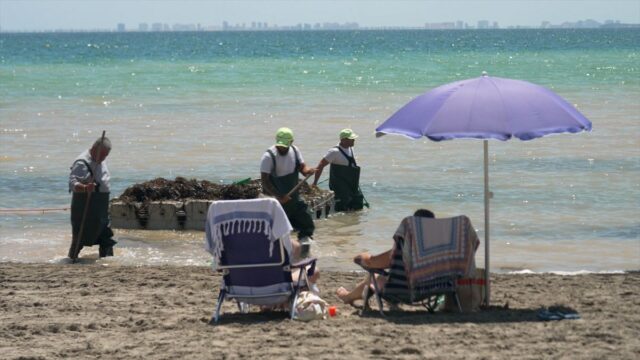Environmental activists in Spain are doing what is necessary to protect their local waterways from pollution and biodiversity loss.
Europe’s largest saltwater lagoon, the Mar Menor in Spain, is slowly being poisoned by pollution caused by intensive agriculture and livestock farming, former mines and rampant tourism infrastructure and development. However, the irony is that, on paper, it is protected by numerous environmental laws.
Five years ago, local lawyer, professor and activist Teresa Vicente became convinced that the only way to adequately protect the Mar Menor was to ensure it legal status of person.
He led a historic campaign supported by thousands of protesters, which ultimately led to his People’s Legislative Proposal (a provision that allows citizens to propose a law to parliament) becoming law. In September 2022, the Spanish Senate approved it as law: it was the first time that an ecosystem in Europe had the right to the conservation of its species and habitats and protection against harmful activities.
«The smell of rotting vegetation was getting stronger»
In the Spanish province of Murcia, we met Teresa and fellow environmental lawyer Eduardo Salazar Ortuño at the Mar Menor lagoon. As they took us to an area near the Rambla del Albujón, the smell of rotting vegetation became stronger and stronger as we reached the edge of the lagoon. Just ahead was a large expanse of pale water; Eduardo explained that it was this color because all underwater plant life had been exterminated.
Teresa grew up near the lagoon and now finds it almost unbearable to see it.
«It makes me want to cry every time I come here. But at the same time, I get a strong fighting spirit, to give the right to the Mar Menor,” he explained to Euronews.
«The Mar Menor is all of us, because we are all part of nature»
Teresa says that the lagoon is now legally considered a legal personality.
«The Mar Menor is an entity of life, a person. He is a subject who can defend himself. But in itself, in this case, it means that the whole world is Mar Menor, because we are nature.
In April 2024, Teresa won the prestigious Goldman Environmental Prize for his work, often described as the «Nobel Verde».
Eduardo said that there are three active court cases that are pending before the courts, under the new legal status of the Mar Menor.
«The rights of the Mar Menor [ahora] They are ahead of the rights of the owners around the Mar Menor. When we go to court, we have one right before another right. It is not an object that does not want to be contaminated, no, it is a person who does not want to be contaminated.
Companies fined for pouring brine into lagoon
While the lagoon is still contaminated, there have been some positive changes. Earlier this year, companies that dumped brine into the lagoon from desalination plants were fined more than two million euros and the Spanish government has increased its budget to clean up the effects of the pollution.
Teresa’s campaign began after the ecological collapse of 2019, when fish, crustaceans and underwater plants were virtually wiped out due to severe eutrophication.
Eutrophication occurs when green algae grow uncontrollably, fed by excess nitrates from fertilizers. It blocks light, preventing plants from growing and producing oxygen. In August 2021, five tons of dead fish washed ashore.
Eduardo Salazar Ortuño explains: «The collapse is, you can imagine here on the shore it was full of fish, they wanted to have oxygen to breathe. And before the fish, 80% of the flora disappeared. 80%!
Ramón Pagán, another environmentalist and president of a local residents’ association, said he was worried this could happen again this year, as recent heavy rains have washed large amounts of nitrates into the lagoon.
He took us to the town of Los Nietos, a once vibrant town on the edge of the lagoon. Tourists no longer visit because the beach is brown and muddy, and the air smells of rotting plants. Many houses are empty and several restaurants have closed.
Returning the bats to Blanca
Meanwhile, 80 kilometers to the northwest, the town of Blanca sits on the banks of the Segura river. Here local environmentalists are trying a different strategy to protect their waterway: They want to bring back the bats that used to live here.
Bats are important to ecosystems because they control insect populations, pollinate plants, and disperse seeds. The bats used to live in caves along the riverside cliffs, but the population was decimated about 20 years ago when the cliffs collapsed, destroying the caves.
Neftali Escribano, ambassador of the European climate pactorganized a workshop in June to make wooden bat boxes which will be hung on the trees next to the rivers to attract the bats back to Blanca.
Be careful with water
Euronews and the European Commission have partnered to promote Water Wise campaignof the EU, #WaterWiseEU. Our series, Water Matters, and the EU campaign aim to raise awareness of the increasing pressure on Europe’s water systems and the need for sustainable water management. Water Matters delves into various water-related issues, highlighting the importance of protecting nature and ecosystems integral to the water cycle. Through engaging content, Euronews and the European Commission hope we can inspire people and communities to become #WaterWiseEU.








